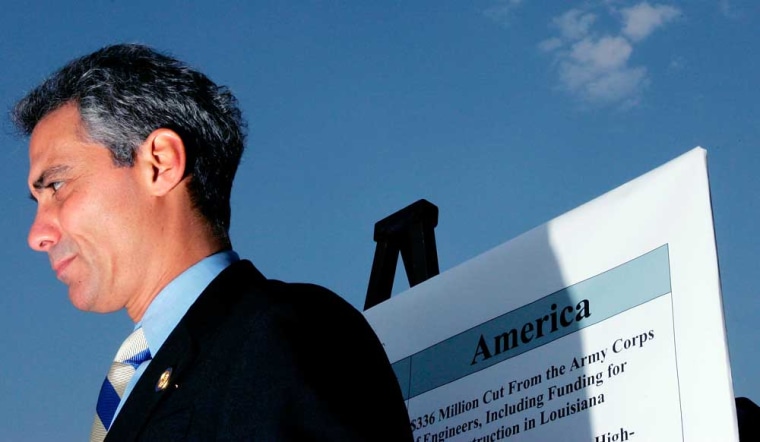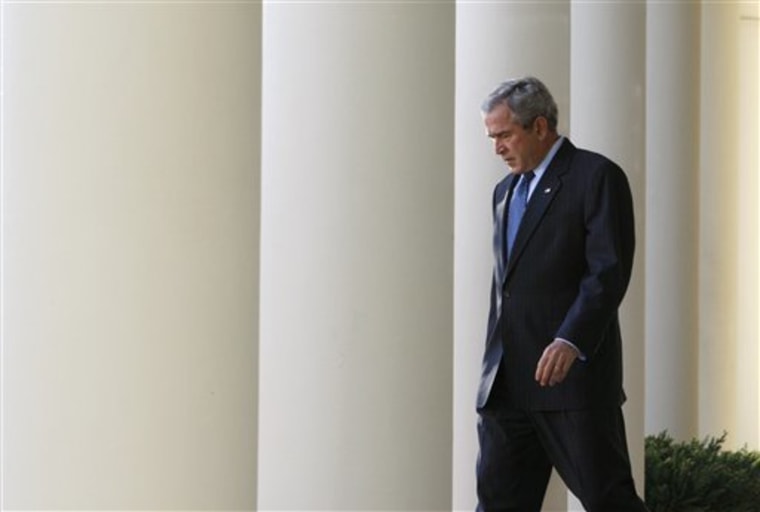President Bush scolded Congress for its meager accomplishments as lawmakers returned Monday for an abbreviated holiday season session.
Taxes, spending, paying for the war, energy, farm subsidies and wiretapping top a crowded list of items Congress will consider during the three weeks.
"The end of 2007 is approaching fast and the new Congress has little to show for it," Bush said in the Rose Garden. "I call on members to use the time left to support our troops, and to protect our citizens, prevent harmful tax increases and responsibly fund our government."
Partisan feelings are especially intense and fights are brewing on multiple fronts between Democrats who control Congress and Bush.
The Democrats' goal is to make sure they don't stumble over must-do legislation funding government agencies and programs, and preventing millions of upper middle income taxpayers from falling prey to the alternative minimum tax, or AMT.
They vow to bring the appropriations process to a close, even at the price of giving in to Bush's strict funding levels for domestic programs like education, grants to local governments and energy research. But many Congress-watchers thinks it's just as likely Congress will limp home for Christmas having passed yet another temporary stopgap funding bill.
"If they send me an irresponsible spending bill, I will veto it," Bush said.
Bush insisted that Congress pass his war funding request; he is expected to devote much of December to attacking Democrats for trying to condition additional money on a timetable for withdrawing troops from Iraq. His war-related requests so far this year have totaled almost $200 billion.

Rep. Rahm Emanuel, D-Ill, chairman of the House Democratic Caucus, issued a statement challenging Bush's priorities.
"A sagging economy has left American families struggling on the home front while thousands of American troops are risking their lives on the battlefront," Emanuel said. "This morning, the president called on Congress to approve plans for more the same. The status quo might be acceptable to the president, but this Congress will insist on a new direction."
Democrats counter that the Pentagon can juggle its books to provide the needed money for current operations, but that further funding a change in administration policy was necessary to make sure U.S. forces don't stay in Iraq indefinitely.
"We're going to continue to try to see if we can't get in place a timetable for the removal of most of the troops that we have there," Senate Armed Services Committee Chairman Carl Levin, D-Mich., said on CNN's "Late Edition." "Congress should be able to state a goal for the removal of most of the American troops without a veto threat."
The Senate is slated this week to try again to pass a $50 billion infusion for operations in Iraq and Afghanistan, said Jim Manley, spokesman for Senate Majority Leader Harry Reid, D-Nev. But Republicans are sure to filibuster the measure over conditions attached by Democrats, including setting a nonbinding goal of removing combat troops by Dec. 15, 2008.
Congress also must pass a temporary fix to the AMT to prevent 20 million taxpayers from getting hit with tax increases averaging $2,000. House Democrats insist on paying for the AMT fix with revenue increases elsewhere. Republicans have promised to block that approach in the Senate. The common wisdom holds that any AMT fix will ultimately add to the deficit.
Even if the AMT is fixed, Democrats are likely to take a political hit. Delays in addressing the minimum tax are keeping the IRS from preparing tax forms and computer programs for the upcoming filing season, which means million of taxpayers counting on early refunds will be getting them later.
Democrats announced agreement Friday to move ahead with energy legislation that would raise automobile fuel economy standards, increase the use of ethanol as a motor fuel, and boost the use of alternative fuels such as wind and solar technology, by electric utilities. If the bill passes and Bush signs it, the energy reforms would join a slender roster of Democratic accomplishments, including a minimum wage increase and increases in college aid.
Other items on a crowded December agenda include:
—Terrorist surveillance. The Senate could vote as early as this week to renew the Foreign Intelligence Surveillance Act, which dictates when the government must obtain court permission to conduct electronic eavesdropping.
—Farm bill. The Senate hopes to finish a bipartisan bill extending farm subsidies and food programs after the legislation bogged down over GOP attempts to add unrelated tax provisions.
—Children's health care. Negotiations should continue on legislation to expand the State Children's Health Insurance Program by $35 billion over five years.
With time so precious, leverage is flowing to Bush, who's armed with both a veto pen and enough Republican allies in the Senate to sustain filibusters against bills they don't like. When legislation — such as the AMT fix — simply has to pass, that leverage gives Republicans the edge in driving the outcome.
Also on the Senate agenda this week, Manley said, is ratification of a free trade agreement with Peru.
